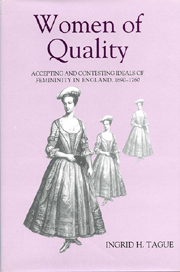Book contents
7 - Public Life, Influence, and Politics
Published online by Cambridge University Press: 12 September 2012
Summary
In a 1712 letter, Anne Pye asked for help in getting her brother-in-law a job in the Lynn or Yarmouth customs house. “I dont question but you have your share of trouble frequently of this nature,” Anne apologized, “the inconveniance that attends great men, impossible to sattisfie all.” But the “great man” in this case, Lord Treasurer Oxford, was not the recipient of the letter. Instead, Anne was writing to her cousin and friend Abigail Harley, Oxford's sister. Her comment, moreover, revealed her assumption that Abigail must often receive such requests. Her letter was indeed just one of many such petitions sent to the Harley women, and she was in turn part of a much larger network of obligation and influence among the early eighteenth-century Quality. The previous chapters of this book have discussed women's involvement in a wide variety of activities, all of which were in some way acceptable by virtue of their association with femininity. It has been my contention, however, that through such activities the women of this study constantly reworked ideals of femininity, and that their behavior held significant public implications. In a very real sense, then, the personal was political. But direct participation in public life through the exploitation of influence was equally important to many women. Such influence on the local and national level enabled them to achieve power and status by helping their social inferiors and by promoting their own interests.
- Type
- Chapter
- Information
- Women of QualityAccepting and Contesting Ideals of Femininity in England, 1690–1760, pp. 194 - 217Publisher: Boydell & BrewerPrint publication year: 2002

